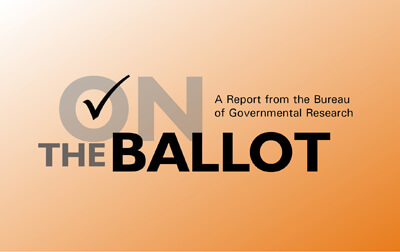
BGR Opposes N.O. Property Tax Propositions on Dec. 5 Ballot
By Biz New Orleans Staff
Source: Biz New Orleans
November 16, 2020
NEW ORLEANS – In a new report, the Bureau of Governmental Research – a private, nonprofit government watchdog – analyzes three separate propositions to replace several property taxes that will expire at the end of 2021.
BGR said the replacement taxes would take effect at the beginning of 2021 and run for 20 years. They would have the same combined rate as the existing taxes – 5.82 mills ($23.4 million in 2021). However, the propositions would change the tax dedications. They would increase funding for infrastructure, housing and economic development, while decreasing funding for public libraries. They would also add early childhood education as a new permissible use for some of the libraries’ tax revenue. The three propositions are as follows:
- Proposition 1 (infrastructure and maintenance) would replace a 1.77-mill tax for streets and traffic signals and a 0.56-mill tax for capital projects with a single 2.619-mill tax for streets, drainage, public facilities, vehicles and equipment.\
- Proposition 2 (libraries and early childhood education) would replace a 2.58-mill tax for libraries with a single 0.987-mill tax for libraries and early childhood education.
- Proposition 3 (housing and economic development) would replace a single 0.91-mill tax for housing and economic development with two separate taxes – a 1.05-mill tax for housing and a 1.164-mill tax for economic development.
For any proposition voters reject, the City plans to levy the existing tax at its current rate in 2021. It could then place another tax proposition on the ballot next year before the tax expires.
BGR’s report finds that the merits of the tax propositions vary significantly. The proposed infrastructure tax would sustain essential funding for streets and drainage while expanding the permissible uses to address other long-neglected needs for building maintenance and vehicles. Spending money on these purposes maximizes the lifespan of public assets and saves on repair and replacement costs down the road. The proposed investment in early childhood education is likely to produce substantial benefits for economically disadvantaged children and the public at large.
But to varying degrees, BGR finds concerns about the lack of spending plans for the proposed tax dedications. For the infrastructure tax, this means voters cannot fully assess whether the tax will make meaningful progress toward addressing identified needs. In the case of the housing tax, the City’s existing planning and evaluation processes for potential tax-funded projects mitigate this concern. However, the lack of a detailed spending plan for the economic development tax is a greater concern. Considering the City’s position that the tax is essential to respond to urgent economic and workforce development issues, it should be able to demonstrate readiness and capacity to direct revenue to well-developed initiatives. Meanwhile, the proposed library tax reduction lacks the backing of adequate strategic and financial planning, and could continue the library system’s roller coaster ride of surpluses and deficits.
Due to the highly interconnected nature of the tax propositions, the library tax presents voters with a couple of conundrums. First, because it is paired with early childhood education, voters must approve the most problematic tax dedication in order to approve one of the most promising dedications. Second, the City’s plan to keep the combined tax rate the same is predicated upon voter approval of the reduced library millage. If voters reject the library dedication but approve one or both of the other propositions, the combined rate could increase by up to 1.593 mills for one year.
Based on its analysis, BGR has taken a position against all three propositions. For several years, BGR has urged City leaders to re-examine New Orleans’ tax dedications for opportunities to redirect revenue to help meet important community needs without raising taxes. The City’s millage rededication proposal adheres to the spirit of that call. However, it does not give voters adequate information for decision making on taxes that would run for 20 years. Voters are asked to approve a nearly 40% revenue cut for public libraries without a strategic plan or a clear roadmap for right-sizing their budget before their reserves run out. The proposal further asks voters to increase taxes for infrastructure, housing and economic development without any spending plans. As a result, all propositions have significant flaws, despite the compelling needs they might address.
If voters reject the propositions, the City plans to levy the existing taxes for another year. It could then address the shortcomings of the propositions and return to voters in 2021. The City should deliver a new proposal that makes a clear case for each of its components. In the meantime, the City should maintain its current $3 million commitment to early childhood education, a well-developed purpose in the current proposal.
Fair Use Notice
This site occasionally reprints copyrighted material, the use of which has not always been specifically authorized by the copyright owner. We make such material available in our efforts to advance understanding of issues and to highlight the accomplishments of our affiliates. We believe this constitutes a “fair use” of any such copyrighted material as provided for in section 107 of the US Copyright Law. In accordance with Title 17 U.S.C. Section 107, the material on this site is available without profit. For more information go to: US CODE: Title 17,107. Limitations on exclusive rights: Fair use. If you wish to use copyrighted material from this site for purposes of your own that go beyond “fair use,” you must obtain permission from the copyright owner.
